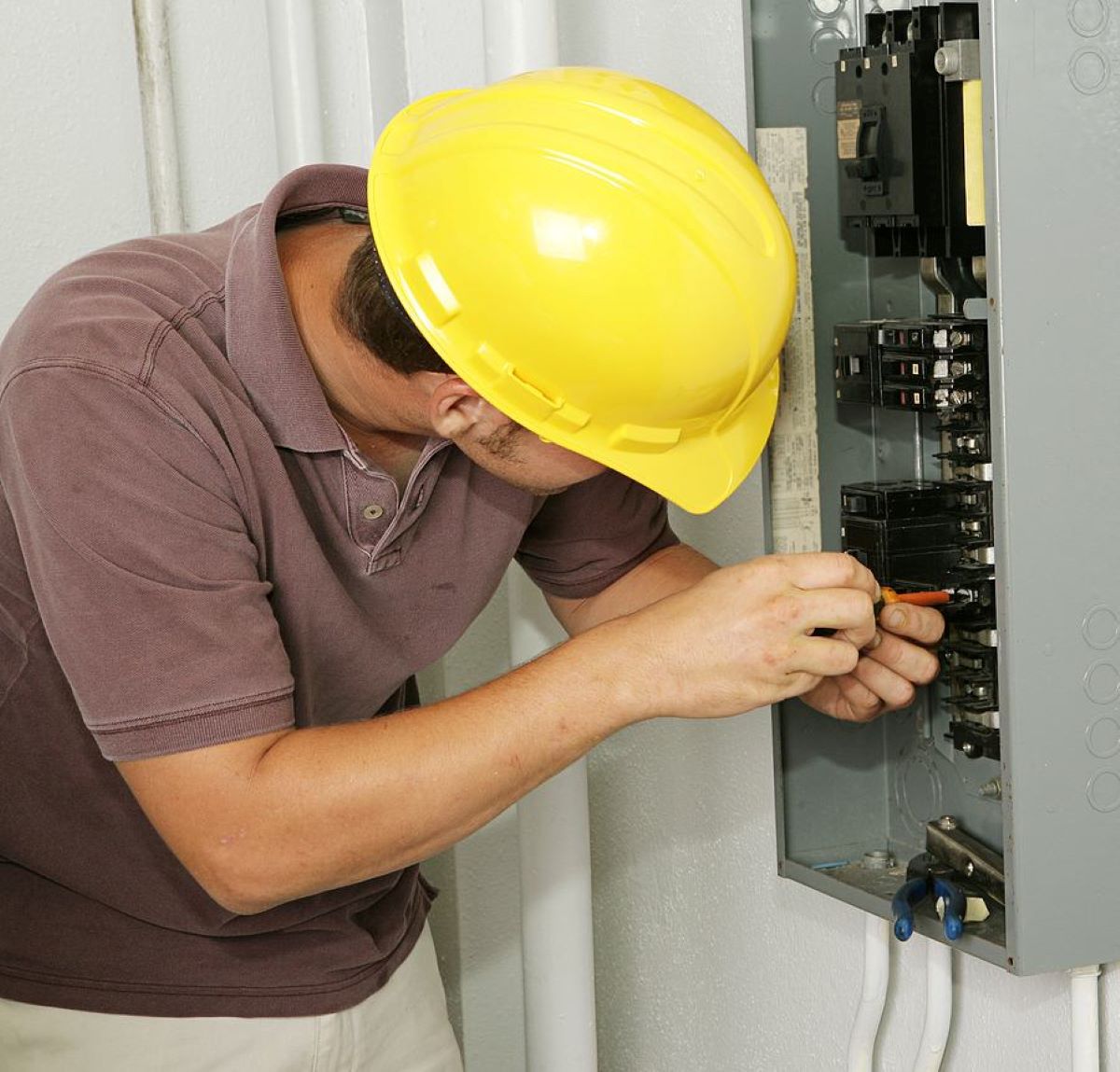

Articles
How Long Do Breakers Last
Modified: December 7, 2023
Discover how long breakers last in this informative article. Explore factors that affect their lifespan and learn how to extend their durability.
(Many of the links in this article redirect to a specific reviewed product. Your purchase of these products through affiliate links helps to generate commission for Storables.com, at no extra cost. Learn more)
Introduction
Welcome to our comprehensive guide on the lifespan of breakers. If you’re wondering how long breakers typically last or what signs to look out for when they are nearing the end of their lifespan, you’re in the right place. Breakers are an essential component of electrical systems, and understanding their lifespan can help you plan for maintenance and replacements.
Breakers, also known as circuit breakers or electrical circuit breakers, are devices designed to protect electrical circuits from damage caused by overload or short circuits. They act as a safety mechanism by interrupting the flow of electricity when an abnormal condition is detected, preventing overheating and potential fires.
Understanding the factors that affect the lifespan of breakers is crucial for homeowners and businesses alike. By knowing how long breakers typically last and recognizing signs of a failing breaker, you can take necessary steps to maintain the safety and efficiency of your electrical system.
In this guide, we will explore the factors that can influence the lifespan of breakers, the average lifespan you can expect, signs to look out for indicating a failing breaker, and maintenance tips to help prolong their lifespan. By the end, you’ll have a better understanding of breakers and how to ensure they function optimally for years to come.
Now, let’s dive deeper into the world of breakers and uncover the secrets behind their lifespan.
Key Takeaways:
- Breakers typically last 15-30 years in residential settings, 10-25 years in commercial environments, and 20-40 years in industrial applications. Regular maintenance and monitoring are crucial for ensuring optimal performance and safety.
- Signs of a failing breaker include frequent tripping, burning smells, hot temperatures, and physical damage. Proactive maintenance, such as regular cleaning, testing, and avoiding overloading circuits, can help prolong the lifespan of breakers and maintain electrical safety.
Read more: How Long Do Trampolines Last
What are breakers?
Breakers, also known as circuit breakers or electrical circuit breakers, are devices that provide protection to electrical circuits. They are designed to detect and interrupt excessive current flow in a circuit, preventing damage to the electrical system and potential hazards.
Breakers have a crucial role in ensuring the safety and functionality of electrical systems. They act as the first line of defense against overloads, short circuits, and other electrical faults. When a fault occurs, such as an overload or a short circuit, the breaker will trip and interrupt the current flow, preventing further damage to the circuit and the connected devices.
Breakers are composed of several key components:
- Switch contacts: These are the main contacts in the breaker that open and close the circuit. They control the flow of electricity through the breaker.
- Thermal and magnetic trip elements: These elements are responsible for detecting abnormal currents and activating the tripping mechanism. The thermal trip element responds to sustained overcurrents, while the magnetic trip element reacts to short-duration, high-current events.
- Tripping mechanism: This mechanism is activated by the trip elements and physically opens the switch contacts to interrupt the current flow.
- Arc extinguishing system: Breakers are equipped with an arc extinguishing system to safely extinguish any arcs that may occur when the switch contacts open. This system prevents damage to the breaker and surrounding components.
Breakers come in various types and sizes, depending on the specific application and electrical system requirements. They can be found in residential, commercial, and industrial settings, protecting everything from small appliances to large machinery.
Overall, breakers are fundamental components of electrical systems. They safeguard against electrical faults and provide a level of protection that helps to prevent damage, fires, and electrical hazards. Understanding their function and importance is essential for maintaining the safety and efficiency of electrical systems.
Factors Affecting the Lifespan of Breakers
The lifespan of breakers can vary depending on several factors. Understanding these factors can help you anticipate how long your breakers are likely to last and take appropriate measures to maintain them. Let’s explore the key factors that can affect the lifespan of breakers:
- Quality of the Breaker: The quality of the breaker itself plays a significant role in its lifespan. Higher-quality breakers tend to have better construction, more durable components, and enhanced protection features. Investing in good quality breakers from reputable manufacturers can result in a longer lifespan.
- Electrical Load: The electrical load placed on the breaker can impact its lifespan. Continuously operating the breaker close to or at its maximum rated capacity can cause excessive heat buildup and stress, leading to premature wear and failure. It is essential to ensure that the electrical load is within the breaker’s specified limits to prolong its lifespan.
- Operating Conditions: The environment in which the breaker operates can affect its lifespan. Factors such as temperature, humidity, dust, and vibration can contribute to the wear and tear of the breaker components. Breakers installed in harsh or extreme conditions may require more frequent maintenance and replacements.
- Maintenance: Regular maintenance is crucial for maximizing the lifespan of breakers. Routine inspections, cleaning, and testing can help identify any issues early on and prevent them from escalating into major problems. Keeping the breaker and its surroundings clean and free from dust and debris can also contribute to its longevity.
- Proper Installation: Breakers must be properly installed according to the manufacturer’s guidelines and electrical codes. Incorrect installation, such as loose connections or improper wiring, can cause excessive arcing and damage the breaker. Ensuring proper installation is essential for optimal performance and lifespan.
- Frequency of Tripping: Breakers that trip frequently may experience more stress and wear on their internal components. Excessive tripping can be a sign of underlying issues in the electrical system, such as overloads or short circuits. Identifying and addressing the root causes of frequent tripping can help prolong the lifespan of the breaker.
It’s important to note that while these factors can influence the lifespan of breakers, there is no definitive timeframe for their longevity. Each electrical system and usage scenario is unique, and the lifespan of breakers can vary. Regular monitoring, maintenance, and prompt replacement of faulty breakers are key in ensuring the safety and efficiency of your electrical system.
Typical Lifespan of Breakers
The typical lifespan of breakers can vary depending on factors such as quality, usage, and maintenance. While there is no exact lifespan that applies to all breakers, there are some general expectations for how long they can last under normal conditions. Let’s explore the typical lifespan of breakers:
Residential Breakers: In residential settings, where breakers are subjected to relatively lower loads and fewer operational cycles, breakers can last anywhere from 15 to 30 years. However, it’s important to note that the lifespan can be influenced by factors such as the quality of the breaker, maintenance practices, and the electrical load placed on the breaker.
Commercial Breakers: In commercial environments, breakers may be exposed to higher usage and more demanding electrical loads. As a result, their lifespan tends to be slightly shorter compared to residential breakers. On average, commercial breakers can last between 10 to 25 years.
Industrial Breakers: Industrial breakers are designed to withstand heavy-duty usage and harsh operating conditions. They are built to be more robust and durable compared to residential and commercial breakers. With proper maintenance and care, industrial breakers can have a lifespan ranging from 20 to 40 years.
It’s important to keep in mind that these timeframes are general estimates and should not be considered as guarantees. Each electrical system is unique, and the lifespan of breakers can be influenced by various factors, such as the electrical load, operating conditions, and maintenance practices.
Regular inspections and maintenance can help identify any signs of wear and tear and allow for timely replacements. It’s recommended to consult with a licensed electrician or a professional in the field to assess the specific conditions of your electrical system and provide guidance on the lifespan of your breakers.
Additionally, advancements in technology and improvements in breaker design may result in longer-lasting breakers in the future. Manufacturers are continually striving to enhance the lifespan and performance of breakers, incorporating innovative features and materials to ensure greater durability.
Keeping track of the age and performance of your breakers, along with regular maintenance, can help ensure their optimal functionality and provide a safe electrical environment for your home or business.
Regular maintenance and inspection can help extend the lifespan of circuit breakers. Keep an eye out for signs of wear and tear, and replace any damaged breakers promptly to prevent electrical hazards.
Signs of a Failing Breaker
Identifying the signs of a failing breaker is crucial for maintaining the safety and functionality of your electrical system. Ignoring these signs can lead to potential hazards such as electrical fires or damage to your appliances. Here are some common indicators that your breaker may be failing:
- Frequent Tripping: If your breaker trips frequently, especially without any noticeable changes in the electrical load, it could be a sign of a failing breaker. While occasional tripping is normal, excessive or random tripping indicates that the breaker is not functioning properly and may require attention.
- Burning Smell or Scorch Marks: If you notice a burning smell coming from the breaker panel or detect scorch marks around the breaker, it is a clear indication of a problem. These signs may suggest overheating or arcing within the breaker, which needs immediate attention from a qualified electrician.
- Hot to the Touch: A properly functioning breaker should not become excessively hot. If you notice that a specific breaker feels unusually warm or hot to the touch, it could indicate that it is experiencing excessive heat buildup or loose connections. This should be investigated promptly to prevent further damage.
- Dimming or Flickering Lights: If the lights in your home or business dim or flicker when certain appliances or circuits are in use, it could be a sign of an overloaded or failing breaker. This dimming or flickering may occur when the electrical load exceeds the capacity of the breaker, indicating that it is struggling to handle the demand.
- Physical Damage: Inspect the breaker panel for any signs of physical damage, such as cracks, corrosion, or loose wires. Physical damage can compromise the integrity and functionality of the breaker, leading to potential failures.
- Age of the Breaker: Breakers have a limited lifespan, and as they age, their performance may deteriorate. If your breakers are older and have been in use for a prolonged period, it may be wise to consider replacing them, even if no immediate signs of failure are present.
If you notice any of these signs, it is important to take immediate action. Electrical issues can pose serious risks, and attempting to troubleshoot or repair them on your own can be dangerous. It is best to seek the assistance of a qualified electrician who can diagnose the problem accurately and recommend the appropriate course of action.
Remember, proactive maintenance and regular inspections are key to identifying failing breakers before they become a safety hazard. Being attentive to these signs can help keep your electrical system running smoothly and protect your home or business from potential electrical incidents.
Read more: How Long Do Rugs Last
Maintenance Tips to Prolong the Lifespan of Breakers
Regular maintenance is essential for prolonging the lifespan of breakers and ensuring the safety and reliability of your electrical system. By following these maintenance tips, you can minimize the risk of breaker failures and optimize their performance:
- Keep the Breaker Panel Clean: Dust, debris, and dirt can accumulate in the breaker panel over time, impeding proper heat dissipation and potentially causing malfunctions. Regularly clean the breaker panel using a dry cloth or a low-power vacuum cleaner to remove any contaminants.
- Inspect for Loose Connections: Loose connections can cause overheating and arcing, leading to premature breaker failure. Periodically inspect the breaker panel for any signs of loose wires or visibly damaged connections. Tighten any loose connections or have a qualified electrician address the issue.
- Avoid Overloading the Circuit: Ensure that the electrical load on each breaker does not exceed its maximum capacity. Overloading can cause excessive heat buildup and stress on the breaker, shortening its lifespan. If you find that you frequently trip a specific breaker, consider redistributing the load or installing a dedicated circuit.
- Test the Breakers: Regularly test the functionality of your breakers to ensure they are operating correctly. Use a circuit tester or a multimeter to check for proper voltage and continuity. If a breaker fails the test, consult a professional electrician for further inspection and potential replacement.
- Monitor for Excessive Heat: Pay attention to the temperature of the breakers during normal operation. If you notice any breakers becoming excessively hot to the touch, it could indicate an underlying problem. Contact an electrician to investigate and address the issue.
- Upgrade Aging Breakers: Breakers have a limited lifespan, and as they age, their performance may decline. If your breakers are older and approaching the end of their expected lifespan, consider upgrading to newer, more efficient models. Consult with an electrician to determine the best course of action.
- Ensure Proper Ventilation: Adequate airflow is crucial for maintaining the optimal temperature of the breaker panel. Make sure that the area around the breaker panel is free from obstructions and adequately ventilated. Avoid storing items or blocking vents near the breaker panel.
- Follow Manufacturer Guidelines: Adhere to the manufacturer’s guidelines and recommendations for installation and maintenance of the breakers. These guidelines are specific to the brand and model of the breaker, and following them ensures that the breakers operate at their best.
- Seek Professional Assistance: If you are unsure about any maintenance procedures or notice any significant issues with your breakers, it is best to seek the help of a qualified electrician. They have the expertise and knowledge to address any concerns and ensure proper maintenance and safety.
By following these maintenance tips, you can enhance the longevity and reliability of your breakers. Remember, electrical systems can be complex, and handling maintenance without proper knowledge and experience can lead to accidents or further damage. If in doubt, always consult a professional electrician to ensure the safety and efficiency of your electrical system.
Conclusion
Understanding the lifespan of breakers and how to maintain them is crucial for the safety and functionality of your electrical system. Breakers play a vital role in protecting circuits from overloads and short circuits, preventing potential hazards such as fires and electrical damage.
Factors such as the quality of the breaker, electrical load, operating conditions, and maintenance practices can influence the lifespan of breakers. While there is no exact timeframe for their longevity, residential breakers typically last between 15 to 30 years, commercial breakers around 10 to 25 years, and industrial breakers from 20 to 40 years.
It is important to recognize the signs of a failing breaker, such as frequent tripping, burning smells, hot temperatures, and physical damage. Promptly addressing these signs can prevent further damage and ensure the safety of your electrical system.
Maintaining breakers through regular inspections, cleaning, testing, and proper installation is essential for prolonging their lifespan. Monitoring the electrical load, avoiding overloading circuits, and seeking professional assistance when needed are important steps in maintaining optimal breaker performance.
By following these maintenance tips and being proactive in caring for your breakers, you can help prolong their lifespan and maintain the safety and efficiency of your electrical system for years to come.
Remember, when it comes to electrical systems, it is always best to consult with a qualified electrician who can provide expert guidance and ensure that your breakers are functioning optimally.
Frequently Asked Questions about How Long Do Breakers Last
Was this page helpful?
At Storables.com, we guarantee accurate and reliable information. Our content, validated by Expert Board Contributors, is crafted following stringent Editorial Policies. We're committed to providing you with well-researched, expert-backed insights for all your informational needs.















0 thoughts on “How Long Do Breakers Last”